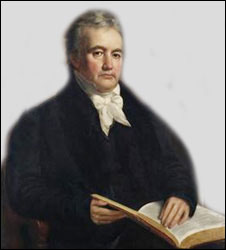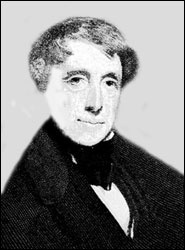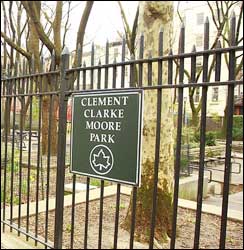Clement Clarke Moore had 2 mentors who "inspired" him to write his now famous poem: John Pintard, Jr., and Washington Irving.

John Pintard, Jr. (1759–1844) with
a "King James" Bible on his lap! |
| |
Pintard and Irving worked feverishly for a "Holy Roman" Empire States of America, with a Stuart on the throne, and the capital in New York City!!
When their dreams were shattered by General Jackson, they set about to create the legend of New World "Discoverer" Christopher Columbus.
Before that time, most Americans ignored the legendary Columbus, because they knew that John Cabot was the real Discoverer of North America. |
|
|

Washington Irving (1783–1859) created
the legend of Christopher Columbus.
|
Pintard wrote nothing, but as the founder of the New York Historical Society he introduced the city to the "Dutch" St. Nicholas.
On the other hand Irving was a prolific writer. One of his books was entitled: The Legend of Sleepy Hollow, and a multi-volume historical fiction work entitled: A History of the Life and Voyages of Christopher Columbus.
It is no wonder then that Irving inspired slave owning Moore to write a poem about the legendary Saint Nicholas, aka Santa Claus.
Clement Clarke Moore was Professor of Oriental and Greek Literature, as well as Divinity and Biblical Learning, at the General Theological Seminary of the Protestant Episcopal Church in New York City.

Clement Clarke Moore
(1779–1863).
|
| |
That Episcopalian "scholar" had a BA and an MA from Columbia College, later Columbia University,
in Babylon on the Hudson!
An Episcopalian is a Catholic who doesn't speak Latin!
His poem is supposedly the best poem ever written by an American!
Satan (Santa) has no compunction about using donkey DNA "scholars" or "academics" to deceive the whole world! |
|
|

Clement Clarke Moore Park in the
Chelsea area of New York City.
|
His poem a "Visit from St. Nicholas" was first published anonymously in 1832. Moore publicly claimed authorship in 1837, but he never acknowledged that "Christmas" was actually stolen from the Chinese. A reverse of intellectual property theft:
'Twas the night before Christmas, when all through the house
Not a creature was stirring, not even a (computer) mouse;
The stockings were hung by the chimney with care,
In hopes that St. Nicholas soon would be there;
The children were nestled all snug in their beds,
While visions of sugar-plums danced in their heads;
And mamma in her ’kerchief, and I in my cap,
Had just settled our brains for a long winter’s nap,
When out on the lawn there arose such a clatter,
I sprang from the bed to see what was the matter.
Away to the window I flew like a flash,
Tore open the shutters and threw up the sash.
The moon on the breast of the new-fallen snow
Gave the lustre of mid-day to objects below,
When, what to my wondering eyes should appear,
But a miniature sleigh, and eight tiny reindeer,
With a little old driver, so lively and quick
I knew in a moment it must be St. Nick.
More rapid than eagles his coursers they came,
And he whistled, and shouted, and called them by name;
"Now, Dasher! now, Dancer! now, Prancer and Vixen!
On, Comet! on, Cupid! on, Donder and Blitzen!
To the top of the porch! to the top of the wall!
Now dash away! dash away! dash away all!"
As dry leaves that before the wild hurricane fly,
When they meet with an obstacle, mount to the sky;
So up to the house-top the coursers they flew,
With the sleigh full of Toys, and St. Nicholas too.
|
. |
And then, in a twinkling, I heard on the roof
The prancing and pawing of each little hoof.
As I drew in my head, and was turning around,
Down the chimney St. Nicholas came with a bound.
He was dressed all in fur, from his head to his foot,
And his clothes were all tarnished with ashes and soot;
A bundle of Toys he had flung on his back,
And he looked like a pedler just opening his pack.
His eyes—how they twinkled! his dimples how merry!
His cheeks were like roses, his nose like a cherry!
His droll little mouth was drawn up like a bow
And the beard of his chin was as white as the snow;
The stump of a pipe he held tight in his teeth,
And the smoke it encircled his head like a wreath;
He had a broad face and a little round belly,
That shook when he laughed, like a bowlful of jelly.
He was chubby and plump, a right jolly old elf,
And I laughed when I saw him, in spite of myself;
A wink of his eye and a twist of his head,
Soon gave me to know I had nothing to dread;
He spoke not a word, but went straight to his work,
And filled all the stockings; then turned with a jerk,
And laying his finger aside of his nose,
And giving a nod, up the chimney he rose;
He sprang to his sleigh, to his team gave a whistle,
And away they all flew like the down of a thistle,
But I heard him exclaim, ere he drove out of sight,
"Happy Christmas to all, and to all a good-night."
|
Here is how that poem should read if Moore had acknowledged that "St. Nicholas" and "Christmas" were stolen from the Chinese. All that's missing in the poem is the transliteration of the names of the 8 tiny white horses:
'Twas the night before Buddhamas, when all through the house
Not a creature was stirring, not even a mouse;
The stockings were hung by the chimney with care,
In hopes that St. Buddha soon would be there;
The children were nestled all snug in their beds,
While visions of Dragon' Beard Candy danced in their heads;
And mamma in her ’kerchief, and I in my cap,
Had just settled our brains for a long winter’s nap,
When out on the lawn there arose such a clatter,
I sprang from the bed to see what was the matter.
Away to the window I flew like a flash,
Tore open the shutters and threw up the sash.
The moon on the breast of the new-fallen snow
Gave the lustre of mid-day to objects below,
When, what to my wondering eyes I beheld
But a miniature rickshaw, and eight tiny white horses,
With a little old driver, so lively and busy
I knew in a moment it must be St. Buddha.
More rapid than eagles his coursers they came,
And he whistled, and shouted, and called them by name;
"Now, Dasher! now, Dancer! now, Prancer and Vixen!
On, Comet! on, Cupid! on, Donder and Blitzen!
To the top of the porch! to the top of the wall!
Now dash away! dash away! dash away all!"
As dry leaves that before the wild hurricane fly,
When they meet with an obstacle, mount to the sky;
So up to the house-top the coursers they flew,
With the sleigh full of Toys, and St. Buddha too.
|
. |
And then, in a twinkling, I heard on the roof
The prancing and pawing of each little hoof.
As I drew in my head, and was turning around,
Down the chimney St. Buddha came with a bound.
He was dressed all in fur, from his head to his foot,
And his clothes were all tarnished with ashes and soot;
A bundle of Toys he had flung on his back,
And he looked like a pedler just opening his pack.
His eyes—how they twinkled! his dimples how merry!
His cheeks were like roses, his nose like a cherry!
His droll little mouth was drawn up like a bow
And the beard of his chin was as white as the snow;
The stump of an opium pipe he held tight in his teeth,
And the smoke it encircled his head like a wreath!
He had a broad face and a little round belly,
That shook when he laughed, like a bowlful of jelly.
He was chubby and plump, a right jolly old elf,
And I laughed when I saw him, in spite of myself;
A wink of his eye and a twist of his head,
Soon gave me to know I had nothing to dread;
He spoke not a word, but went straight to his work,
And filled all the stockings; then turned with a jerk,
And laying his finger aside of his nose,
And giving a nod, up the chimney he rose;
He sprang to his rickshaw, to his team gave a whistle,
And away they all flew like the down of a thistle,
But I heard him exclaim, ere he drove out of sight,
"Happy Buddhamas to all, and to all a good-night."
|
"Old Nick" is another name for Satan the Devil, and the Apocalypse warns US about the deeds of the Nicolaitans (Apocalypse 2:15).
Holy Scripture describes Satan as a Dragon, a Roaring Lion, a Serpent, and an Angel of Light. In the case of St. Nicholas or St. Buddha he comes as an Angel of Light bearing gifts for little children!
References



